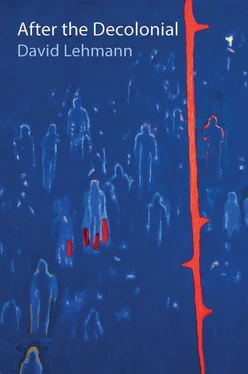David Lehmann - After the Decolonial
Здесь есть возможность читать онлайн «David Lehmann - After the Decolonial» — ознакомительный отрывок электронной книги совершенно бесплатно, а после прочтения отрывка купить полную версию. В некоторых случаях можно слушать аудио, скачать через торрент в формате fb2 и присутствует краткое содержание. Жанр: unrecognised, на английском языке. Описание произведения, (предисловие) а так же отзывы посетителей доступны на портале библиотеки ЛибКат.
- Название:After the Decolonial
- Автор:
- Жанр:
- Год:неизвестен
- ISBN:нет данных
- Рейтинг книги:4 / 5. Голосов: 1
-
Избранное:Добавить в избранное
- Отзывы:
-
Ваша оценка:
After the Decolonial: краткое содержание, описание и аннотация
Предлагаем к чтению аннотацию, описание, краткое содержание или предисловие (зависит от того, что написал сам автор книги «After the Decolonial»). Если вы не нашли необходимую информацию о книге — напишите в комментариях, мы постараемся отыскать её.
, pervasive borrowing and mimesis. Moreover, it has not integrated its own disruptive feminist branch, and it has taken little interest in either the interwoven history of indigenous religion and hegemonic Catholicism or the evangelical tsunami which has upended so many assumptions about the region’s culture.
The book concludes that in Latin America, where inequality and violence are more severe than anywhere else, and where COVID-19 has revealed the deplorable state of the institutions charged with ensuring the basic requirements of life, the time has come to instate a universalist concept of social justice, encompassing a comprehensive approach to race, gender, class and human rights.












